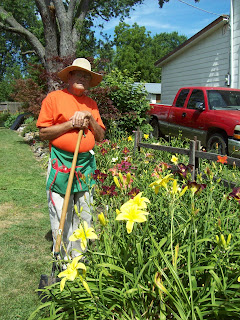 |
| Kimmswick Dayliy Garden |
I've had a whole year to consider what I will plant to fill in this garden and decided daylillies would be the best choice. Daylillies (hemerocallis) grow in thick bunches, have lovely blooms, are minimal care and important to my Burmuda grass battle, shade the ground. Burmuda grass once established, can never be eradicated by non-chemical means, so I decided to pursue the easiest option, hence daylilies.
 |
| Mr. Carrol Wrather |

My son and I broke up the dry, dry, dry clay left below the removed roofing felt in my southside garden---pick axe mandatory, then added a soil mixture of these components: 4-40 lb. bags of topsoil, 2-40 lb. bags of cow manure compost and 2 bags of mushroom compost. It was hard work, but will benefit the newly planted daylilies and the central small shrub, Ninebark, now planted in this southern exposure garden. Ninebark (Physocarpus opulifolius) is a Missouri Native shrub, which will add seasonal flowers to support both pollinators and nesting birds.
There was only one nursery in Missouri that had this shrub available, so my road trip to Kimmswick morphed into a garden trek to the outskirts of Jefferson City to visit the Missouri Wildflower Nursery. See their website here http://mowildflowers.net/ They have a WONDERFUL free catalog loaded with pictures, categorized by plant sun and soil requirements, along with a helpful star rating appraising plant culture. My 2 gallon potted Ninebark was very reasonably priced, approximately a foot and a half tall and not pot bound. I am pleased to have found this Native plant nursery, as I continue to work to naturalize my yard and gardens. Next Spring should be exciting!
No comments:
Post a Comment